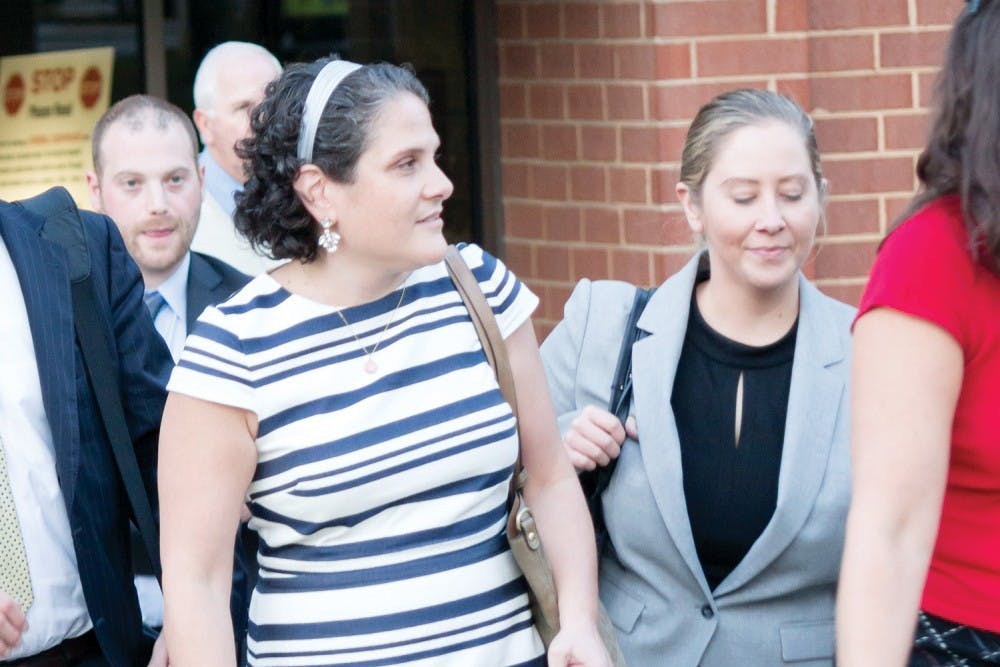During this academic year, the lawsuits filed against Rolling Stone magazine have made headlines, from the start to the finish of former Assoc. Dean Nicole Eramo’s defamation lawsuit and the current preparations for Phi Kappa Psi’s upcoming trial.
Nicole Eramo’s lawsuit against Rolling Stone
The trial for Eramo’s $7.85 million lawsuit against Rolling Stone magazine, Sabrina Rubin Erdely and Wenner Media, Inc. began Oct. 17, 2016. Eramo was suing over her depiction in Rolling Stone’s November 2014 article “A Rape On Campus,” which she said falsely represented her as indifferent towards the case of an alleged gang-rape victim at the Phi Kappa Psi fraternity house, who was identified in the article under the alias “Jackie.”
The trial, which lasted over three weeks, concluded with the jury finding Erdely, the magazine and its publisher liable for actual malice on several accounts.
As a result, the jury awarded Eramo $3 million in damages, with $2 million coming from Erdely and $1 million from Rolling Stone and Wenner Media, Inc.
Attorneys for Rolling Stone, Erdely and Wenner Media, Inc. then filed a motion Dec. 5, 2016 asking a federal judge to overrule the jury’s decision.
The lawsuit ultimately concluded when Eramo filed a motion April 11 for voluntarily dismissal of the case. The defendants did not object, and Eramo reached a settlement with Rolling Stone, Erdely and Wenner Media, Inc. — the terms of which are confidential.
The future of journalism
An investigation by the Charlottesville Police department found no evidence of the gang rape described in Erdely’s article, and the Columbia Journalism Review published a report on the article identifying its many falsities. This “failure that was avoidable” — as described by the Columbia Journalism Review — left its mark on the journalism industry.
Media Studies Prof. of Practice Wyatt Andrews said it’s difficult and a rarity for national news outlets to publish articles as factually incorrect as Erdely’s.
“In the largest news outlets in America, most people do not understand how hard it is to get absolutely fake things in a mainstream newspaper or broadcast news account because at the national level there are ethical standards, and there are serious checks and balances,” Andrews said.
Andrews said Rolling Stone previously had a reputation of having a “formidable” fact-checking department. The idea that the article was able to surpass this fact-checking to publishing was a wake-up call to the journalism community.
“I think it’s very obvious that what happened to Rolling Stone and U.Va. reverberated through the journalist community and reaffirmed to those agencies that have strong fact-checking units, ‘We really need to pay attention when they raise flags,’” Andrews said. “Responsible news editors around the country looked at the collapse of Rolling Stone’s once-impressive fact-checking operation and asked themselves, ‘Could that happen to us?’”
Andrews also said the article may have more of an impact on how journalists approach their sources. He referenced advice given to journalists by author Jon Krakauer — who wrote a book about sexual assault at the University of Montana — encouraging journalists to listen to both the accusers and the accused with an initial attitude of belief and then checking the facts to tell the best story.
“The answers from a journalistic perspective was ‘believe everyone, talk to everyone and write the facts as you see them,’” Andrews said. “If Erdely had done that, she might have still had an article, but it might not have done the damage that it did.”
Rolling Stone’s next lawsuit — Phi Kappa Psi v. Rolling Stone
The University’s chapter of Phi Kappa Psi is currently pursuing an ongoing $25 million lawsuit against Rolling Stone for defamation.
Law Prof. George E. White told The Cavalier Daily the fraternity had yet to be designated as either a private citizen or a public figure and that this will be a “critical” part of the case.
“If they are a public figure, then they will have the same burden of proof Eramo had — they will need to show clear and convincing evidence of actual malice,” White said.
White added he believes it is “likely” that the fraternity will be deemed to be a public figure. In order to be designated a public figure, one has to be visible and in the public eye, along with being in a position where they are held accountable to public comment, White said.
“They are part of a national organization, they are an integral part of University social life, they engage in activities,” White said. “I am virtually certain they will be treated as a public figure.”
Aside from providing evidence that the article was written with “actual malice,” White said the fraternity will also need to prove the statements made were not only false but also damaging to their reputation.
White said that one issue he believes the fraternity will face is the question of whether or not the conduct of some members of the fraternity, in spite of Jackie having “made this whole thing up,” is enough to damage the reputation of the institution as a whole.
“It is of course damaging to their reputation because among the statements made was that this was an initiation rite — that a gang rape was a part of initiation,” White said. “If it’s initiation, it suggests that the fraternity as an institution condoned this behavior.”
White also said the only similarity between the lawsuits filed by Eramo and the University’s chapter of Phi Kappa Psi is that defamation action in both cases was triggered by statements that came from the same article.
The 10-day jury trial is scheduled to begin Oct. 25.






